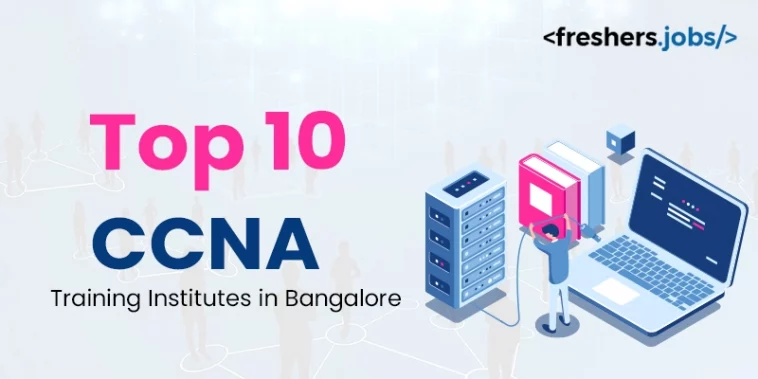CCNA, also called Cisco Certified Network Associate, is a widely recognized entry-level certification exam in networking. The fundamental knowledge and abilities are validated to set up, run, and troubleshoot small to medium-sized business networks.
The CCNA certification has become crucial for professionals navigating the intricate networking world. CCNA certification steers professionals towards success in an era marked by connectivity, collaboration, and ongoing innovation. We will explore the Top 10 CCNA Training Institute in Bangalore, their significance, key aspects, and job opportunities.
List the top 10 CCNA Training Institute in Bangalore.
- FITA Academy
- Edureka
- Simplilearn
- Intellipaat
- Besant Technologies
- Inventateq
- SevenMentor
- TIB Academy
- IP4 Networkers
- Global Training Bangalore
FITA Academy
FITA Academy, a well-known training institution, provides an extensive range of more than 120 courses available in both online and offline formats. Recognized for delivering crucial technical and professional certifications, the academy consistently maintains a prominent position in the industry. With a team of more than 1,000 trainers boasting decades of experience, the institute has positively impacted the learning journeys of more than 75,000 individuals. By establishing multiple branches in Bangalore, Chennai, Pondicherry, Coimbatore, and Madurai, the academy underscores its commitment to delivering top-notch training. This calculated growth guarantees that people in different areas can get access to excellent training programs.
Why choose the CCNA Course in Bangalore at FITA Academy?
It is a smart choice to enroll in the FITA Academy’s CCNA Course in Bangalore for a number of reasons. The comprehensive CCNA classes offered by FITA Academy in Chennai cover basic to advanced concepts to impart in-depth knowledge in the areas of Networking Fundamentals, Routers and Switches, Network Access, IP Connectivity, IP services, Security Fundamentals, Firewalls, and Automation, including CRUD, data encoding, and HTTP verbs. Two capstone projects in real time are part of the course format, which improves the hands-on learning opportunity. By balancing affordability and quality, FITA Academy makes sure that the course is accessible to a diverse group of students. Weekday and weekend classes are accommodated by the institute’s flexible batch scheduling. After completing their course, individuals can also receive assistance with placement.
Customized Curriculum for CCNA Classes in Bangalore
CCNA Classes in Bangalore include a carefully planned curriculum that covers all the fundamentals. Topics include TCP vs UDP, IPv4 vs IPv6, Physical Interfaces, Network Components, VLAN Configuration, LLDP, and Cisco Discovery Protocols. In the following domains, students become proficient: Network configuration, IP connectivity, routing, first hop redundancy, IP services, NAT configuration, DNS, and DHCP roles are all related to Cisco wireless architectures. Other topics covered include security fundamentals, device access control, VPNs, access control lists, Layer 2 security, authentication, and wireless security protocols. More advanced subjects include Automation, Controller-based Networking, REST-based APIs, JSON-encoded data interpretation, North- and South-bound APIs, Traditional Campus Device Management. Students are prepared for real-world networking issues with this comprehensive program, which guarantees a thorough understanding of CCNA principles.
Expert Instructors at CCNA Institute in Bangalore
This CCNA Institute in Bangalore leads knowledgeable instructors with a great deal of practical experience in the field. These educators are committed to teaching pupils academic material while also offering sage, practical guidance. They are essential for ensuring that students are well-prepared for this fast-paced area by keeping them informed about the most recent developments in the business.
Project Presentation Sessions at CCNA Institute in Bangalore
Project presentation sessions are a unique component of the CCNA Institute in Bangalore offered by FITA Academy. Designed to help students apply the knowledge and principles they have learned in real-world circumstances, these courses recognize the value of practical experience in helping students grasp the CCNA and preparing them for a successful career.
Complimentary Placement Sessions at CCNA Course in Bangalore
Offering a thorough CCNA Course in Bangalore that goes beyond the conventional classroom, is FITA Academy’s mission. The institute offers free placement workshops that help students get ready for the competitive job market. These sessions cover important topics like career counseling, interview skills development, resume preparation, and job placement aid. The purpose of the placement session is to help students achieve their career goals. FITA Academy helps graduates find employment by utilizing its extensive network of over 1,500 partner organizations, which offers a variety of opportunities in the industry. Through this vast network, students are guaranteed access to bright job opportunities, enabling a smooth and successful transfer into the working world.
Edureka
Among the reputable online platforms, Edureka stands out for providing an adaptable CCNA Course covering basic to advanced principles. Despite the fact that the institute offers a wide range of services, the emphasis on online learning may restrict in-person interactions between students and instructors, driving up costs.
Simplilearn
Specializing in CCNA Classes for both beginners and advanced learners, Simplilearn provides a curriculum with valuable learning materials. However, compared to other institutions, the cost of the courses might be somewhat higher.
Intellipaat
Delivering CCNA courses is a top priority for Intellipaat since it improves abilities and offers useful industrial knowledge. However, they predominantly focus on online classes, and their course price might be expensive.
Besant Technologies
Besant Technologies offers comprehensive CCNA Classes with real-time assistance. Even if they have a lot of facilities, their course costs may be higher than other institutions.
Inventateq
Inventateq specializes in offering CCNA courses that are customized to meet the needs of particular industries. They might not offer as much placement support as other institutes, though.
SevenMentor
SevenMentor offers a comprehensive CCNA education that imparts critical abilities. But in comparison to other universities, this course might not be the greatest choice for students seeking a more thorough and in-depth education.
TIB Academy
TIB Academy focuses on providing tailored CCNA Classes for industry-specific needs. In contrast to other institutes, their practical training component might not be as extensive.
IP4 Networkers
IP4 Networkers, which specializes in CCNA classes covering comprehensive ideas, provides these advantages; however, their placement support may not be as complete as that of some other institutes.
Global Training Bangalore
Global Training Bangalore offers CCNA courses that place a strong emphasis on teaching core competencies. However, it’s crucial to keep in mind that their practical training program could not be as extensive as some other schools.
Freshers Jobs carefully selected these institutes following a thorough investigation, taking into account student feedback, brand reputation, and a history of student accomplishments.
Role of CCNA in Modern Business
Business needs the Cisco Certified Network Associate (CCNA) certification to meet the need for qualified networking experts. Meeting the networking needs of modern businesses depends heavily on this certification, which covers a wide range of topics including network architecture, security, cloud computing, enabling remote work, career advancement, vendor neutrality, flexibility in response to changes in technology, and global recognition. The CCNA certification is a useful tool in today’s business environment because of its many advantages. The benefits, necessary elements, and employment opportunities it presents will all be covered in detail in later parts.
What is CCNA?
CCNA/Cisco Certified Network Associate is a well recognized credential offered by Cisco Systems, a major leader in networking and information technology. The goal of the CCNA certification is to verify the core abilities and expertise required for efficiently administering, fixing problems, and guaranteeing the security of networks at the company level. Considered by many to be a fundamental certification, the CCNA is perfect for anyone just starting out in networking or for those looking to validate their existing networking knowledge. Professionals in adjacent fields, such system administrators, who want to improve their knowledge of networking fundamentals, might also benefit from it.
Advantages of CCNA
- Industry Recognition: CCNA is a globally esteemed certification with significant prestige in the IT and networking sector. Attaining CCNA status affirms a foundational grasp of networking concepts and technologies.
- Foundational Knowledge: CCNA encompasses many networking topics, furnishing individuals with a strong foundation in networking principles, protocols, and technologies. This foundational knowledge is essential for advancing to more complex networking skills.
- Career Advancement: CCNA certification amplifies career prospects by enhancing an individual’s marketability to employers. It often serves as a prerequisite for higher-level Cisco certifications and other advanced roles in networking.
- Validation of Skills: CCNA certification authenticates an individual’s proficiency in configuring, managing, and troubleshooting Cisco networks. This validation is invaluable for professionals aiming to showcase their competence in networking.
- Networking Competence: CCNA covers various technologies, including routing and switching, IP addressing, network security, and wireless networking. This extensive coverage ensures that certified individuals understand key networking concepts well.
- Global Recognition: CCNA holds international recognition, enabling certified professionals to pursue job opportunities globally and engage in networking projects with an international scope.
- Preparation for Advanced Certifications: CCNA serves as a stepping stone for individuals aspiring to pursue advanced Cisco certifications like CCNP (Cisco Certified Network Professional) or specialized security, wireless, or data center networking certifications.
- Employability: CCNA certification boosts employability, rendering individuals more appealing to employers seeking skilled networking professionals. It opens doors to network administrator, support engineer, or technical specialist roles.
- Adaptability to Evolving Technologies: CCNA undergoes regular updates to reflect changes in networking technologies. This ensures that certified individuals stay current with industry trends and are equipped to handle the challenges of evolving technologies.
- Community and Resources: CCNA certification provides access to a community of certified professionals and valuable resources. Networking with peers and accessing Cisco’s educational materials contribute to ongoing professional development.
- Hands-on Experience: CCNA often incorporates practical, hands-on labs and simulations, enabling individuals to apply their knowledge in real-world scenarios. This practical experience is invaluable for building confidence and competence.
Key Components of CCNA
Network Fundamentals
- OSI Model: Explore the seven layers of the OSI model, understanding the purpose and functions of each layer. Learn about data encapsulation and de-encapsulation as data traverses the network.
- TCP/IP Stack: Investigate the TCP/IP protocol suite, examining key protocols like TCP, UDP, IP, and ICMP. Understand how these protocols facilitate communication across diverse network environments.
- Protocols: Besides TCP/IP, delve into essential protocols like ARP (Address Resolution Protocol), DHCP, and DNS. Gain insights into how these protocols facilitate address resolution, dynamic host configuration, and domain name resolution.
- Basic Network Infrastructure: Explore network infrastructure components such as routers, switches, hubs, and repeaters. Understand their roles in facilitating communication within a network.
Routing and Switching
- Routing Protocols: Explore protocols like OSPF (Open Shortest Path First) and EIGRP (Enhanced Interior Gateway Routing Protocol). Learn how routers exchange routing information and make dynamic routing decisions.
- VLANs (Virtual LANs): Understand the concept of VLANs and their role in logically segmenting a network. Explore how VLANs enhance network efficiency and security.
- Switch Operation: Study the operations of network switches, including MAC address learning, VLAN assignment, and frame forwarding. Explore switch configurations for optimal network performance.
IP Addressing and Subnetting
- IP Address Fundamentals: Further explore IP addressing, distinguishing between IPv4 and IPv6. Learn about address classes, reserved addresses, and the structure of IPv6 addresses.
- Subnetting: Delve into subnetting techniques, mastering the ability to create subnets and allocate IP addresses efficiently. Understand subnet masks, CIDR notation, and the impact of subnetting on network design.
Wireless Networking
- Wireless Configuration: Explore the configuration of wireless networks, including setting up access points, defining SSIDs, and implementing security measures such as WPA (Wi-Fi Protected Access).
- Wireless Standards: Understand wireless standards like 802.11a/b/g/n/ac and explore their differences. Examine how these standards impact network performance and coverage.
Security Fundamentals
- Access Control Lists (ACLs): Dive into implementing ACLs to control traffic flow and improve network security. Explore standard and extended ACLs, understanding their application in different scenarios.
- VPNs (Virtual Private Networks): Explore the principles of VPNs, including tunneling protocols and encryption methods. Understand how VPNs secure data communication over public networks.
- Securing Network Devices: Study methods for securing network devices, including configuring secure management access, using SSH (Secure Shell), and implementing physical security measures.
Network Access Control
- Access Controls: Further explore access controls, including the implementation of role-based access controls (RBAC) and the principle of least privilege.
- Password Policies: Examine password policies, including complexity requirements, expiration periods, and account lockout policies. Understand how robust password policies contribute to network security.
Wide Area Networking (WAN) Technologies
- PPP (Point-to-Point Protocol): Explore PPP, a data link layer protocol, to establish a direct connection between two nodes. Understand its application in WAN connectivity.
- Frame Relay: Dive into Frame Relay, a WAN protocol for efficient data transmission over a shared network. Explore its configuration and troubleshooting.
Network Management
- Network Monitoring: Explore network monitoring tools and techniques, including SNMP (Simple Network Management Protocol), for gathering network statistics and performance data.
- Troubleshooting Tools: Learn about common troubleshooting tools like ping, traceroute, and packet analyzers. Understand how to use these tools to diagnose and resolve network issues.
IPv6
- IPv6 Address Configuration: Explore IPv6 addressing, including stateless and stateful address configuration. Understand the benefits of IPv6 over IPv4 and the considerations for dual-stack implementations.
Quality of Service (QoS)
- QoS Mechanisms: Dive into QoS mechanisms such as traffic shaping and policing. Explore how QoS ensures optimal network performance by prioritizing critical data traffic.
Infrastructure Services
- DHCP (Dynamic Host Configuration Protocol): Delve deeper into DHCP, understanding its role in dynamically assigning IP addresses to network devices. Explore DHCP relay agents and DHCP options.
- DNS (Domain Name System): Examine DNS, the system tasked with changing domain names into IP addresses. Understand the hierarchy of DNS and its role in Internet communication.
Network Automation and Programmability
- Ansible and APIs: Explore network automation using Ansible, a popular tool. Understand the basics of APIs and how they enable programmability in network devices.
Troubleshooting
- Problem Identification: Hone troubleshooting skills, focusing on identifying and isolating network issues. Explore methodologies for systematic problem-solving in diverse network environments.
Network Design and Architecture
- Scalability: Understand principles of network scalability, considering factors such as device capacity, bandwidth, and addressing schemes. Explore design considerations for scalable networks.
- Redundancy and High Availability: Explore strategies for achieving network redundancy and high availability, including redundant links, devices, and failover mechanisms.
Security Best Practices
- Firewall Configuration: Dive into firewall configuration, understanding how firewalls enhance network security by controlling incoming and outgoing traffic.
- Intrusion Prevention Systems (IPS): Explore the principles of IPS, understanding how these systems detect and prevent malicious network activity. Consider best practices for implementing IPS in a network.
Job Opportunities after CCNA Certification
- Network Technician: This entry-level position focuses on supporting network infrastructure, troubleshooting connectivity issues, and assisting in configuring network devices.
- Technical Support Specialist: Technical Support Specialists provide technical assistance to end-users, addressing network-related concerns and resolving issues related to network connectivity.
- Help Desk Analyst: Help Desk Analysts offer first-line support, assisting users with technical issues, including network-related problems, and troubleshooting and resolving user-reported network concerns.
- Network Administrator: They oversee a network’s daily operations, including configuration, maintenance, and troubleshooting. This role may also involve managing network security and implementing upgrades.
- Systems Administrator: Systems Administrators manage and maintain an organization’s computer systems, including servers and network infrastructure. CCNA-certified professionals may handle networking and systems administration tasks in this role.
- Network Engineer: Network Engineers design and implement network solutions, optimize performance, and troubleshoot complex network issues. They may also work on projects to expand or upgrade existing networks.
- IT Support Specialist II: An IT Support Specialist II is an advanced support role involving more complex troubleshooting and problem resolution. This position may also contribute to the planning and implementation of IT projects.
- Senior Network Administrator: A Senior Network Administrator is a leader in managing and overseeing the organization’s network infrastructure. This role involves strategic planning, implementing advanced network solutions, and mentoring junior staff.
- Network Architect: Network Architects design and plan an organization’s network structure, making high-level decisions considering business needs, scalability, and security requirements.
- IT Manager/Director: An IT Manager/Director manages the overall IT operations of an organization, including networks. Responsibilities may include budgeting, strategic planning, and overseeing a team of IT professionals.
- Network Security Analyst: Network Security Analysts secure an organization’s network infrastructure, implementing security measures, monitoring for threats, and responding to security incidents.
- Wireless Communications Engineer: Wireless Communications Engineers specialize in designing, implementing, and managing wireless communication systems within organizations, focusing on optimizing wireless network performance.
- VoIP Engineer/Architect: VoIP Engineer/Architects specialize in voice over IP (VoIP) technology, designing and implementing voice communication systems over IP networks. This may involve integrating VoIP solutions with existing infrastructure.
- Data Center Manager: Data Center Managers oversee the operations of a data center, including servers, storage systems, and networking equipment, requiring a deep understanding of data center infrastructure.
- IT Consultant: IT Consultants provide advisory services to organizations on various IT matters, including network design, optimization, and security. They may work independently or as part of a consulting firm.
- Chief Information Officer (CIO): A Chief Information Officer (CIO) is a leadership role at the executive level, overseeing the entire IT department, including network operations. Responsibilities include aligning IT strategy with business goals.
The CCNA certification is essential in the current business landscape. With businesses rapidly undergoing digital transformation, there is an unprecedented demand for skilled professionals equipped with a robust foundation in networking. CCNA, acknowledged as a fundamental certification, not only imparts essential knowledge and skills to students but also positions them as valuable contributors to the evolving connectivity requirements of various industries. We explored the Top 10 CCNA Training Institute in Bangalore, delving into the role of CCNA Certification in the current business landscape, its significance, key components, and the array of job opportunities it offers.





